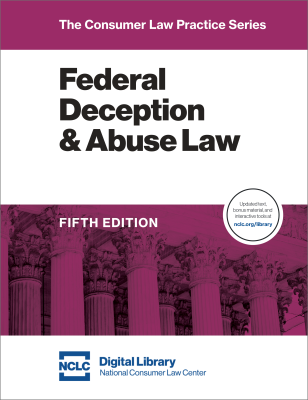2017 saw hundreds of new decisions and FCC actions interpreting the Telephone Consumer Protection Act (TCPA), which provides significant statutory damages for unwanted calls, texts, and faxes. This article outlines the areas where there has been the most significant case law and FCC activity in 2017. All links are to NCLC’s Federal Deception Law Chapter 6—a detailed analysis of all significant TCPA decisions and FCC actions, updated digitally in February 2018.
Interpretation and Validity of the TCPA
Daubert v. NRA Group, L.L.C., 861 F.3d 382 (3d Cir. 2017) reaffirms that the TCPA is remedial legislation that is entitled to liberal construction. In 2017 a court also held that the TCPA applies to insurance companies, despite the McCarran-Ferguson Act. See NCLC’s Federal Deception Law § 6.2.4.3.
A number of 2017 decisions address an emerging constitutional question—whether the existence of the TCPA’s exceptions for emergency calls and calls to collect a debt owed to the federal government are content-based, triggering a higher level of First Amendment scrutiny. Several courts have held that these exceptions are content-based, but that the TCPA is nonetheless constitutional because it and the exceptions serve compelling governmental interests. 2017 decisions also rejected other First Amendment and vagueness challenges. See generally id. § 6.2.4.3.
2017 Decisions on Autodialers and Revocation of Consent
Many 2017 decisions have dealt with whether a call involved an auto-dialer. Courts continue to hold that the dispositive question is not whether a particular call was placed through random or sequential generation of telephone numbers but whether the system has the capacity to generate numbers in this way. 2017 decisions wrestled with the application of this standard when the calling systems required various levels of human intervention. See id. § 6.3.2.
In 2017, the consumer’s consent and revocation of consent continued to be a hotly litigated issue. A message that has both an informational and telemarketing purpose must comply with the written consent requirement that applies to telemarketing calls. Cases also hold that written consent is ineffective if the disclosures on the consent form are not clear and conspicuous. See id. § 6.3.4.1. For non-telemarketing calls, 2017 decisions, including a Seventh Circuit decision, continue to hold that providing a seller with a cell phone number is sufficient consent to receive calls on that phone. See id. § 6.3.4.2.3.
Schweitzer v. Comenity Bank, 866 F.3d 1273 (11th Cir. 2017) finds that, just as a consumer can provide limited consent to receive robocalls, the consumer can also revoke consent partially. Another 2017 case affirms that revocation can be oral. On the other hand, Reyes v. Lincoln Automotive Fin. Servs., 861 F.3d 51 (2d Cir. 2017) holds that consent is irrevocable when part of a binding contract. But a district court in 2017 refused to follow Reyes as incorrectly decided. See NCLC’s Federal Deception Law § 6.3.4.4.
Developments Regarding Robocalls to Collect Government Debt
In 2015, Congress created an exemption from the TCPA for collection of debt owed to or guaranteed by the United States, but required the FCC to adopt implementing regulations. The FCC announced a set of regulations in 2016, but in 2017 it withdrew its request that the Office of Management and Budget approve those regulations. As a result, the rules have not gone into effect. Although other courts have disagreed, the leading decision holds that the exemption does not take effect until rules are adopted, so at present calls to collect government debt must still comply with all aspects of the TCPA. See id. § 6.3.5.
2017 Decisions on Text Messaging and Junk Faxes
Decisions in 2017 support existing precedent that text messaging uses an automatic telephone dialing system and thus is covered by the TCPA where the system generates a large number of text messages. Blow v. Bijora, Inc., 855 F.3d 793 (7th Cir. 2017) questions other court findings that a text message triggered by a natural person’s individualized action always evades the definition of an automatic telephone dialing system, and 2017 decisions have gone in both directions as to whether an autodialer was involved in text messages depending on the facts. See NCLC’s Federal Deception Law § 6.7.2.
The TCPA allows for text messages confirming that a consumer who had previously consented has now opted out of text messages. But a 2017 decision points out that this exemption does not apply where the consumer had never consented to receive text messages. See id. § 6.7.3.
Today, faxes often are received by computers that store the information for later printing instead of by a conventional fax machine. 2017 decisions find that the TCPA fax requirements still apply when a computer receives the fax. A 2017 decision also adds to precedent holding that the consumer need not prove the fax was received, only that the fax was sent. See id. § 6.8.1.
2017 decisions hold that faxes that offer free goods or services or that do not even have an overt sales pitch can still violate the TCPA where they are part of a marketing strategy to sell goods or services. But other 2017 decisions find that the TCPA is not implicated where the fax only requests contact information or participation in clinical trials, confirms a subscription renewal, or lists job openings. See id. § 6.8.2.1.
The TCPA requires an unsolicited faxed advertisement to contain a notice explaining how the recipient can opt out of receiving further faxes, and an FCC rule extends this requirement to faxed advertisements sent with the recipient’s prior express invitation or permission. However, in Bais Yaakov of Spring Valley v. F.C.C., 852 F.3d 1078 (D.C. Cir. 2017), the D.C. Circuit held that the FCC did not have authority to extend this requirement beyond unsolicited faxes. There has been extensive case law on the implications of this decision, whether it is binding outside of the D.C. Circuit, and the effect of waivers that the FCC gave a number of companies. See NCLC’s Federal Deception Law § 6.8.2.4.
Faxes sent pursuant to the established business relationship exemption must still disclose the right to opt out of additional faxes. 2017 cases join existing precedent that failure to do so means that the exemption does not apply; in addition, the opt out notice must strictly comply with the statute and regulation. See id. § 6.8.2.4.
2017 Decisions on Parties Liable for TCPA Violations
2017 case law affirms that a wide range of parties can be liable for TCPA violations. Labor unions are not immune, and individuals such as company presidents can be liable depending on their level of involvement.
Courts continue to hold that the party on whose behalf an advertisement is faxed is liable, although some 2017 decisions draw on the common law of agency to determine if the fax was in fact sent “on behalf of” that party. See id. § 6.9.2.2. Creditors are liable when debt collectors they hire make improper calls to cell phones, without regard to the law of agency. See id. § 6.9.2.4. Sellers can be liable for pre-recorded calls to residential lines and violations of the do-not-call rule where the caller acts as their agent, and violations of some provisions of the FTC telemarketing rule may not even require an agency relationship. See id. § 6.9.2.5.
2017 TCPA Litigation Survives Numerous Spokeo Challenges
TCPA litigants must be prepared in every case to respond to the defendant’s argument that there is no Article III case or controversy standing because the consumer did not suffer a concrete injury. Since the 2016 Supreme Court Spokeo ruling, the overwhelming majority of 2017 TCPA decisions has found Article III standing. See id. § 6.10.3.5. In 2017, courts found the following sufficient to find standing:
- Various ways in which unwanted calls and texts resulted in monetary injury, even where the TCPA violation is viewed as procedural. Id. § 6.10.3.1.
- Invasion of privacy. Id. § 6.10.3.2.
- Intrusion upon and occupation of the capacity of the consumer’s phone. Id. § 6.10.3.3.
- Wasting of a consumer’s time; risk of injury due to interruption and distraction. Id. § 6.10.3.4.
Courts in 2017 found Article III standing for prerecorded calls to residential lines and violations of the do-not-call rule (§ 6.10.4) and in junk fax cases (§ 6.10.5). The leading decision on Article III issues in junk fax cases is Florence Endocrine Clinic, P.L.L.C. v. Arriva Medical, L.L.C., 858 F.3d. 1362 (11th Cir. 2017) finding the TCPA creates a “cognizable legal right.”
Even failure to disclose certain information in TCPA cases has been found to meet Article III standing requirements. See NCLC’s Federal Deception Law § 6.10.6.
NCLC’s Federal Deception Law § 6.10.7 sets out nineteen sample allegations to use in response to a Spokeo challenge, and § 6.10.8 provides links to sample briefs and practice aids regarding Spokeo.
2017 Case Law on TCPA Pleading, Defenses, and Remedies
2017 TCPA case law has found that while a TCPA complaint must plead the necessary facts to support the legal claims, it need not identify the number that was called or the dates of the calls. Courts continue to hold that an allegation of “dead air” or some other telltale sign of an automated call is a sufficient pleading that an autodialer was used. See id. § 6.11.3.
A 2017 decision finds that the TCPA’s Truth in Caller ID Act does not allow for a private right of action. See id. § 6.6.5.
Where the TCPA complaint alleges that a fax was unsolicited, a 2017 decision holds that the defendant has the burden of proof to show that the fax was solicited. See id. § 6.11.5. 2017 TCPA decisions found that laches cannot be a defense and that the consumer has no duty to mitigate damages. See id. § 6.11.6.
2017 cases have reaffirmed that the TCPA is a strict liability statute and that intent is not an element of a TCPA claim unless treble damages are sought. Damages can be recovered in the same case in which an injunction is issued. But a TCPA claim may not survive the death of the called party. See id. § 6.12.1.
2017 case law finds a seller engaged in a willful violation and thus was liable for treble damages where the violations were committed by its telemarketer and the telemarketer was acting within the scope of its authority. Simply instructing the telemarketer to comply with the law is insufficient to escape liability for treble damages. See id. § 6.12.3.
2017 decisions have also reaffirmed the importance of the TCPA’s class action remedy. In 2017 at least a dozen TCPA class actions have been certified. NCLC’s Federal Deception Law § 6.12.5 cites these and a number of other cases where certification was denied.
Coming Next: the D.C. Circuit’s Decision
A development that did not happen in 2017 is a decision by the District of Columbia Circuit in ACA Int’l v. Fed. Communications Comm’n, the industry’s appeal of the FCC’s 2015 order. That order held, among other things, that prior express consent can be revoked by any reasonable method, and it reiterated the FCC’s definition of “automatic telephone dialing system” to include a system that has the capacity to dial numbers randomly or sequentially and that makes a high volume of calls without significant human intervention. Once that decision is issued, NCLC will update the chapter on a fast-track basis to address its implications.
NCLC’s March Fair Debt Collection Conference Will Feature Five TCPA Courses
In addition to the comprehensive treatment in Chapter 6 of NCLC’s Federal Deception Law, another resource on TCPA litigation is NCLC’s annual Fair Debt Collection Conference, this March 19–20 in Chicago. It will feature a full day devoted to TCPA topics. Consumer advocates can register for the conference through this site. Booking for rooms is separately done here. Early Bird discounts are available through February 16.


